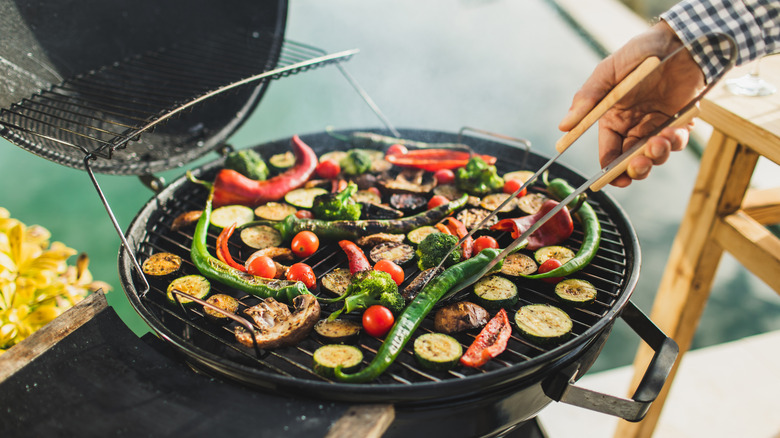The Pros And Cons Of Gas Vs Charcoal Grilling
One of the most heated debates in all of grilling is whether gas grills or charcoal grills are better. Anyone who has worked with either type understands that the styles operate very differently. The fact of the matter is that both gas and charcoal have benefits and drawbacks. To get a better feel for the gas versus charcoal debate, we reached out to Silvio Correa, Private Chef and Brazilian Grill Master.
It's popular to choose charcoal — even Bobby Flay prefers charcoal grills over gas ones. As Correa told Tasting Table, "Natural oak and hickory charcoal provide a unique smoky flavor that is difficult to replicate with gas. It's perfect for authentic Brazilian barbecue, where the smoke enhances the natural flavors of the meat." Flavor is probably the best reason to pick a charcoal grill since nothing can beat that rich taste, but there are other reasons to choose this option as well. "Charcoal can reach higher temperatures," Correa continued. "Which is excellent for achieving a perfect seal."
While charcoal grills have a lot going for them, there are some drawbacks. For starters, charcoal grilling may be better equipped for searing meat because they achieve higher temperatures (up to 1200 degrees Fahrenheit). However, Correa warns, "It can be challenging to maintain a consistent temperature over a long time." If your grill's temperature is constantly fluctuating as you keep the charcoal aflame, you won't have as much control over the cooking process as you might like. Plus, you're stuck with the chore of cleaning debris and ash.
Gas grills are more convenient, while charcoal grills are more flavorful
Charcoal grills have plenty going for them, but gas grills have their own appeal. As Correa puts it, "Gas grills heat quickly and offer precise temperature control, making them ideal for quick weeknight meals." That convenience factor is nothing to scoff at. Gas grills also "maintain a constant temperature for consistent cooking results." And they're easier to clean than charcoal grills since there's no ash residue.
Convenience and consistency are strong character traits in a grill, but the downsides turn some people away. "Gas grills may not have the depth of flavor that charcoal provides," Correa said. (Fortunately, there is an easy method to achieve smoky flavors on a gas grill that involves heating wood chips in a smoker box, or aluminum pouch, or tray.) Another weakness has to do with temperature. "Some poor-quality gas grills may not reach the high temperatures necessary for quick searing." To be clear, good quality gas grills may not have this problem, but not everyone is looking to buy top of the line gas grills.
Certain foods do cook better on a charcoal grill, but you can say the same thing about gas grills. "For dishes where flavor is fundamental, such as Brazilian-style cuts of beef or ribs, charcoal is the right choice," said Correa. "But gas also works... when time is limited or when precision cooking is necessary, such as grilling fish or delicate vegetables."

